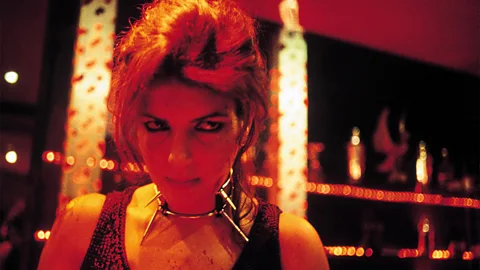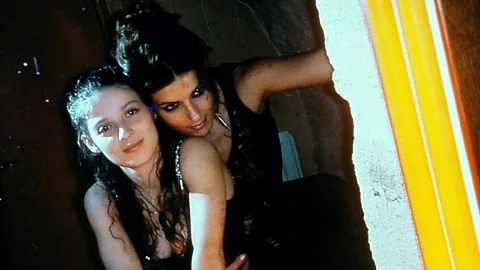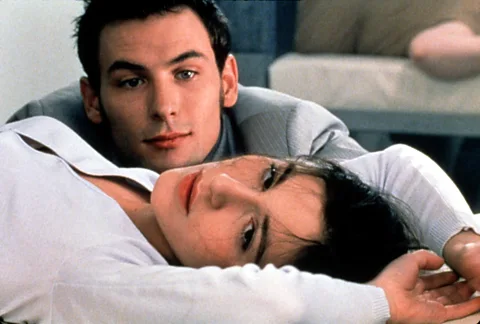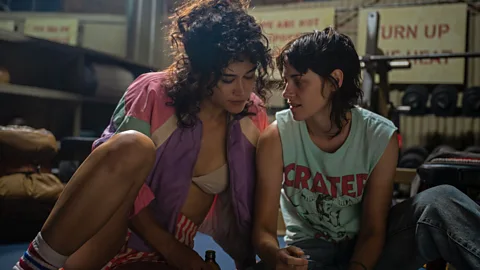'I never imagined it would be banned': The ultra-violent, sexually explicit French thriller now being reappraised
 Alamy
AlamyBack in 2000, a French film was vilified for its tale of two women embarking on a drug-fuelled killing spree. But 25 years on, it's considered revolutionary by some.
When a certain French thriller first arrived in May 2000, premiering at the Cannes Film Festival, it generated a maelstrom of controversy. The film had already been threatened with censorship in France, and some audience members at Cannes reportedly donned T-shirts in solidarity with its writer and co-director Virginie Despentes. Others walked out in disgust. And that was just the beginning of the storm.
Warning: This article contains descriptions of violence and language and content that some may find offensive
Released in French cinemas 25 years ago this month, Baise-moi is a pulpy, ultra-violent odyssey of two women disillusioned with a patriarchal society that is now remembered as one of cinema's biggest cause célèbres. It was created by writer and film-maker Virginie Despentes as a rough-hewn, tongue-in-cheek adaptation of her 1993 debut novel of the same name, and co-directed by adult film actor Coralie Trinh Thi. Partly triggered by a savage act of male violence, during which one of the two lead characters, along with another female friend, is raped, it sees its heroines decide to unleash their anger in revenge, killing off more than a few sexual predators during a drug-fuelled and doomed road trip. In the wake of #MeToo and a new wave of female film-making weaponising "female rage", the film has undergone a reassessment among critics.
 Alamy
AlamyWhere other road movies, such as Bonnie and Clyde (1967) or Thelma & Louise (1991), had also crossed violent terrain and been critically lauded, Baise-moi was vilified from all sides of the political spectrum. The film combines a premise that feels familiar – two outlaws on the run from the authorities – with graphic depictions of sex and murder. It was shot on a shoestring budget – tracking the misdemeanours of its gun-toting heroines through handheld camera footage – and upon its general release in France in June 2000, critics were baffled by its provocatively trashy packaging. "The cinephile press in France tends to be much more interested in aesthetics, in film form, than content and context," Ginette Vincendeau, professor of film studies at King's College, London and critic, tells the BBC. "It was considered ugly." She was one of a handful to review Baise-moi positively when it was released in the UK.
Banned and re-banned
In France, Baise-moi (the title translating literally as "fuck me") was initially released on 64 screens, but after riling right-wing groups in France, such as conversative values organisation Promouvoir, it was given an X rating by the French high court, effectively making it the first film banned in the country for 28 years, as only a clutch of specialist cinemas could show a film with such a prohibitive rating. When it was then released on dvd, it could only be purchased in sex shops. Meanwhile, the left-wing press objected to it for different reasons, being unconvinced at how effectively it conveyed its message, and accusing it of hypocrisy. As The Guardian's critic Peter Bradshaw put it: "Baise-Moi is an understandable counterblast to fatuous middlebrow dramas [...] But the intellectual penetration of this sour, lifeless movie is pretty shallow."
Its pariah status in France came despite a chorus of support from fellow film-makers such as Catherine Breillat, who spearheaded a petition for Baise-moi's re-release, with signatures from other luminaries like Jean Luc-Godard and Claire Denis, which suggested it had fallen victim to "a revival of post-war censorship". Under a new 18 certificate, the film landed back in cinemas without much fanfare the following year. In Australia, campaigns by conservative politicians resulted in the film being pulled out of theatres just two weeks after its release, its distribution squashed there again when it was banned on dvd in 2013.
"I absolutely did not expect so much controversy, and I would never have imagined that we would be banned and find ourselves on the news," co-director Trinh Thi tells the BBC. "It was a punk film intended for an underground audience." But the furore had an unexpected upshot, she says: "The ban had us projected to the front of the media scene, and the film became accessible to the general public." Nevertheless it still only gleaned a meagre $940,944 worldwide, falling short of its $1.35m budget.
 Alamy
AlamySeven years earlier in France, Despentes's novel had enjoyed widespread success, published when she was 24 years old. Then, in 1999, the former sex shop assistant decided to start developing a film version, enlisting her friend Trinh Thi as a collaborator. They both saw the film and book as "completely different" projects, says Trinh Thi, and cast two leads also hailing, like her, from the adult film industry. "It was Despentes who had the idea to make Baise-Moi into a movie when she saw Karen and Raffaëla in the film Exhibition 99 that I lent her," Trinh Thi explains. "Upon seeing them, she immediately imagined them in the roles of Nadine and Manu. She called me right away to talk to me about it. And at first I didn't see what she meant, but I reread the book imagining Karen and Raffaëla in the roles, and it worked perfectly."
The directors sought to address the saturation of hypersexualised – and often brutalised – imagery of women. But they commandeered this flagrant imagery to do so. Wry nods to exploitation flicks such as Abel Ferrara's Ms 45 (1981) or Wes Craven's The Last House on the Left (1972) are littered throughout, from the use of lurid red filters to the pose-striking of its two protagonists, while it features hardcore unsimulated sex scenes. This is self-referentiality capped off with the self-aware, third-wall-breaking dialogue of Manu, who despairs at the absence of "witty lines". Beneath its flame-fanning of controversy, though, Baise-moi deals with serious subject matter. Its unflinching, uncensored rape scene takes on a bitter resonance in light of Despentes's 2006 feminist manifesto King Kong Theory, which detailed her own experience of sexual assault at age 17. "Rape doesn't disturb the peace, it's already part and parcel of the city," she writes.
Its unalloyed and unsimulated use of sex was a recognisable feature of the "French New Extremity" movement – a term coined by Canadian critic James Quandt to describe a transgressive, boundary-flouting wave in French film-making in the 1990s and early 2000s, which also included films by Claire Denis, Olivier Assayas and Gaspar Noé in its ranks.
"Part of it is to do with the cultural myth of France as a country of libertinage – non-repressed sexuality – and the Marquis de Sade," says Vincendeau of Despentes, as well as Breillat's, portrayals of real-life sex in films like Baise Moi and Romance (1999). Vincendeau suggests the directors saw the explicitness of these scenes as a part of a tradition of creative freedom in the country.
However in today's age of the intimacy coordinator, their choice to film actual sex would most likely raise a few eyebrows. Vincendeau notes last year's uproar around Breillat's alleged mishandling of sex scenes on Romance, as detailed in a book by the film's lead actor Caroline Ducey called La Prédation. "These women saw themselves as part of auteur cinema which is considered as expressing and valorising a sense of freedom, breaking boundaries, braving censorship and so on as a marker of artistic excellence. [... Baise-moi] is at the most extreme end of that extreme movement," she adds.
The 'female rage' films it inspired
Arguably, Baise-moi provided the lethal prototype for many female-directed films in a similar vein, especially within the "revenge thriller" genre, where characters exact vengeance against enemies or those who have wronged them. These range from Julia Ducournau's Raw (2016), Ana Lily Amirpour's A Girl Walks Home Alone at Night (2014) and Coralie Fargeat's Revenge (2017) to post-MeToo films like Ducournau's Titane (2021), Emerald Fennell's Promising Young Woman (2020) and Rose's Glass's Love Lies Bleeding (2024); all of these also opt for a violent cinematic language to explore issues of gender or violence against women. In an interview in 2021, Ducournau said that many female film-makers of were concerned with “reclaiming the narrative and taking over the male gaze” right now, and that Despentes had been doing that "for a very long time".
"It is all about seizing power and control in the most visceral way possible, about confronting the traditional male gaze and violently turning it on its head," says critic Nikki Baughan of this grisly new feminist wave. "It only feels subversive because we're not used to seeing female characters take such violent charge of their actions and behaviour, physically or sexually [...] If the protagonists of Baise-moi were male, would the film have been met with such consternation or banned?
 Alamy
Alamy"The very idea that these women have decided enough is enough, and are given – or give themselves – carte blanche to seek their own justice for everything they have been subjected to, and take pleasure in doing so, plays like a cathartic fantasy."
But many critics were – and remain – unconvinced by Baise-moi's deliberately inflammatory way of conveying its anti-patriarchal message. Among the reviewers who couldn't get onboard with the film upon its release was Ian Mantgani, now a film-maker and director of Nosepicker (2023), who called it "adolescent". "At the time, I thought it was amateurish and posturing; provocative without cohesive philosophy, flippant without being funny," says Mantgani.
In the past 25 years, Mantgani’s opinion has shifted. "Maybe some of that holds true, but I’d be less sanctimonious now," he says. "It’s an unbowed, scattershot punk riff; Karen Lancaume and Rafaella Anderson give two forceful, often quite joyous lead performances." In light of Lancaume's death by suicide five years after Baise-moi's release, Mantgani adds: "The fact that Karen got to play this indomitable outlaw in the midst of her porn career before her untimely death gives it a special poignancy too."
Certainly, part of why Baise-moi helped lead a revolution in more extreme women-helmed cinema in France and elsewhere is that it tapped into the same impulses that film had no issue portraying for male characters. "Unlike other films in the French Extremism category, the women actually seem to enjoy sex," Vincendeau highlights. It's worth noting, however, that some people, such as former Telegraph and Daily Mail reviewer Christopher Tookey, have continued to express concern at the films' levels of explicit violence. In a 2021 interview, Tookey discussed how after the release of David Cronenberg's controversial Crash, numerous films had come through which were "brutal and perverted", name-checking Baise-moi among them.
 A24
A24Above all, Baise-moi's divisiveness lies in the fact that it is designed to be uncomfortable, not "likeable", as Sophia Takal – director of Green (2011) and Always Shine (2016), whose work has been categorised as part of female horror's renaissance – adds. "The film was derided for depicting female sexuality and violence without the typical moral framework that would make it palatable: there's no redemption arc, nor any clear condemnation of the characters' choices... the rawness of the performances and the handheld aesthetic created an authenticity that was uncomfortable."
As Despentes mused in a recent interview, she sees the film's confrontation of the dark side of male sexuality as Baise-moi's most enduring element, especially in a digital era of increased misogyny and violent online imagery. "It showed that women could make films about female experience that didn't seek approval or understanding from audiences," Takal says. "It was trying to be honest about rage and trauma in ways that are difficult to watch."
--
If you liked this story sign up for The Essential List newsletter, a handpicked selection of features, videos and can't-miss news, delivered to your inbox twice a week.
